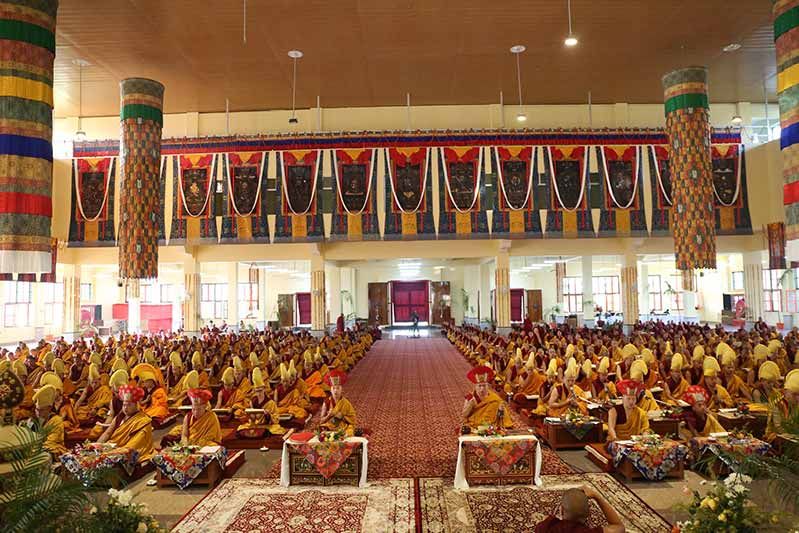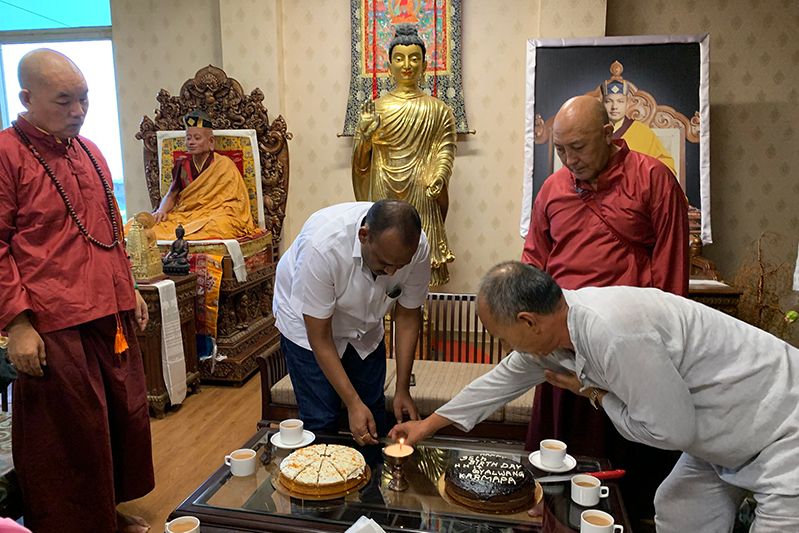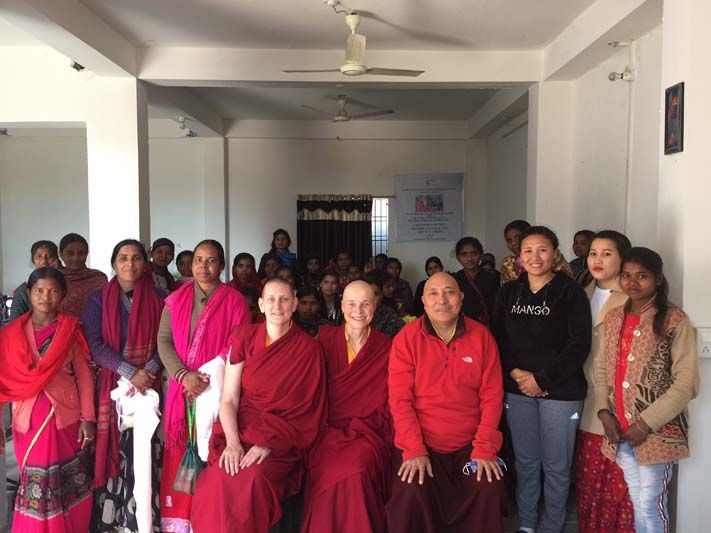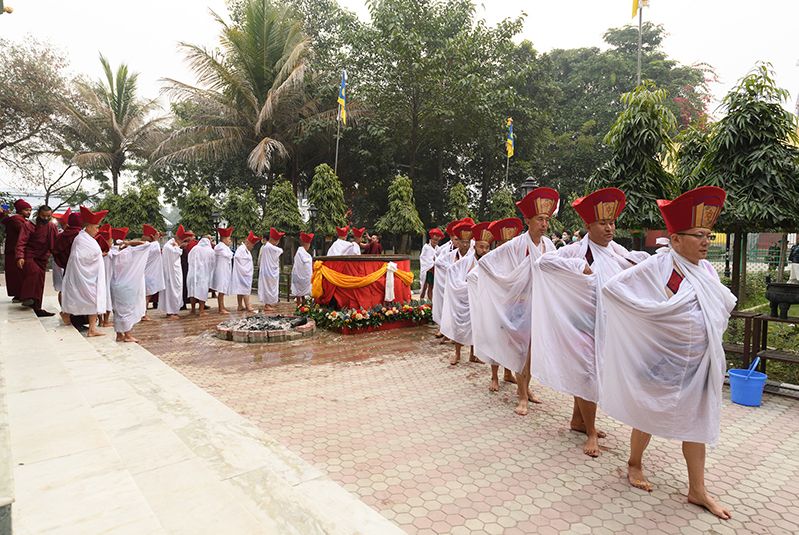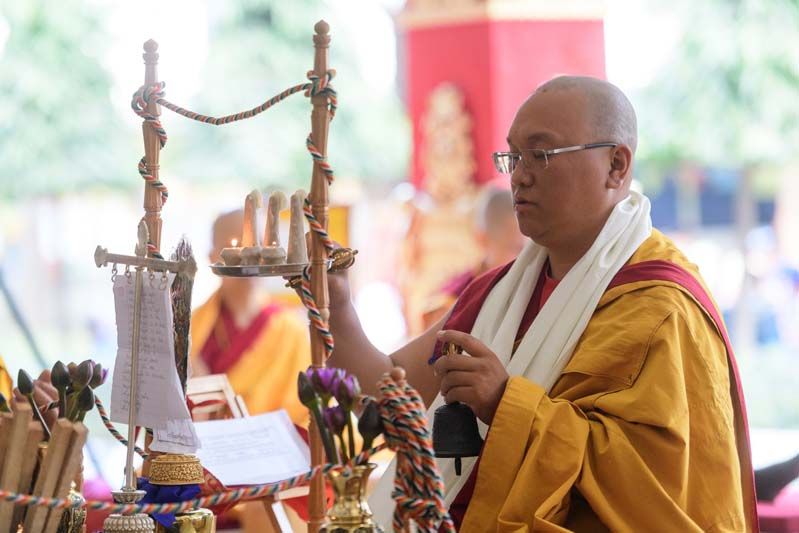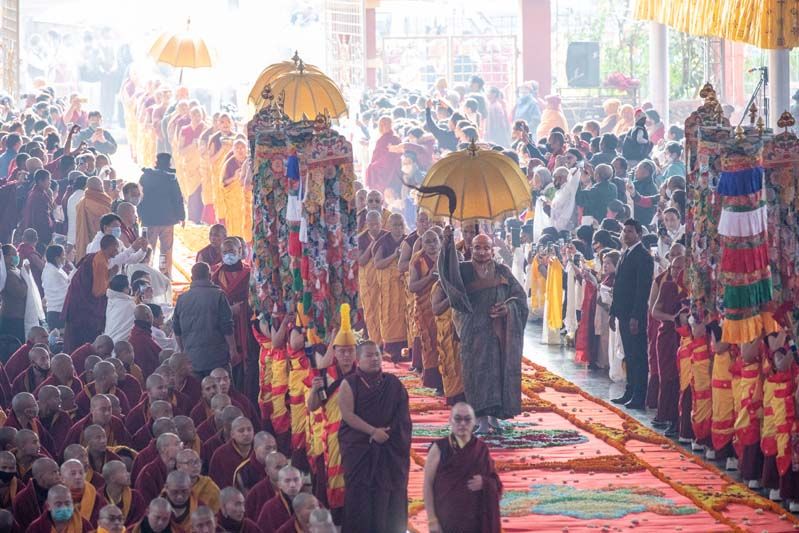Medicine Buddha Empowerment
- December 25, 2007
December 25, 2007, Mahabodhi Stupa, Bodhgaya, India, Translated by Ringu Tulku Rinpoche & Karma Choephel
In addition to the 25th Kagyu Monlam, we have three days of the practice, mantra recitation, and feast offerings of the Medicine Buddha. Today is the first of these days, so I will give an empowerment connected with the Medicine Buddha. Tomorrow I will give a short Dharma teaching on the Medicine Buddha. The great Chandrakirti said:
When one has freedom and a good situation, If he does not restrain himself, He’ll fall into the abyss and lose control. Who will pull him out of there later?
We have a choice about gaining happiness in this life and future lives. We have a choice about whether to follow the genuine Dharma and the path to liberation. We have this choice this one time; it is difficult to get it frequently. This is not only the case with the Dharma. Even in terms of how we lead our lives in this world, we cannot make things happen the way we want. We do not have the control or the opportunity, and this creates many difficulties for us. This is why some people might want to be good people and do good work but find themselves in situations where they have no alternative to doing harmful jobs.
From one perspective, most of us gathered here do not have that sort of difficulty. However we look at it, there is an opportunity right before our eyes to do something virtuous. Whether we take it or not is up to us. If we wish to take it, we have the opportunity. I think that doing something virtuous, something beneficial for sentient beings at this time will make our human lives meaningful.
We have many difficulties in our lives. There are many inequalities in this world. Differences between rich and poor, or male and female, and differences in politics and resources put a lot of pressure on us and create many problems. There is no way for us to lead our lives while ignoring these difficulties. As far as religion, there are many different religions in the world. All religions have their own particular way of explaining their views, which leads them to regard one another with suspicion. Some are not only suspicious, but feel they need to make their own religion triumph over others. Thus it is not easy to live in this world. In both religious and worldly terms, the world is difficult by nature. There is no way to avoid having to endure troubles, no way to live easily and comfortably.
Is the reason there are such difficulties in the world just that the world itself is a difficult place that is by nature full of strife? It is not just that. Although the world is like that, I believe that the way we all think affects our situations greatly.
In my case, for example, my life is connected with Dharma and religious practice. From the time I was born in this world, I have lived in an environment where people have faith in religion, specifically the Buddhist religion. When Apo Gaga, or Ogyen Trinle Dorje, who spent his early years in a Buddhist environment, goes through the world and makes contact with different people and religions, sometimes he encounters difficulties. What are the difficulties? Since I was little, I have had Buddhist habits and been committed to Buddhism. Therefore, I have had to be a bit careful when meeting people of other religions. This is not because of how I feel. It is because my responsibilities put me in a position where I have to be careful. However, there would be nothing wrong with saying that the Buddhadharma is an extremely straightforward and open-minded religion. Now that I have studied the Buddhadharma and gained a decent understanding of it, I do not think my leading a dharmic life conflicts with any religion.
In Buddhist terms, the reason is that karma, cause, and result are most important. The Three Jewels may be important, but karma, cause, and result are more powerful than the Three Jewels. My being Buddhist in this life is the result of a past action. In Buddhist terms, my Buddhist way of life has come about because of karma, cause, and result. Since this is just a result of past actions, there is nothing I can do other than take it up with joy and enthusiasm.
Most other religions believe in God or a creator of the world. From this perspective, too, for me to have Buddhist views and a Buddhist way of life in this lifetime is harmonious with other religions. In terms of the beliefs of other religions, it was God who made me, and it was God who made me become Buddhist. Therefore there is nothing to do but say, “I take refuge in Him” and gladly take this on. This is why I sometimes think that my leading a dharmic life is not in conflict with any other religion. This way of thinking makes me feel comfortable and relaxed about leading a dharmic life.
I also have many worldly difficulties. One is not having any freedom, and then there are difficulties that are not my own but that other people give me. You all see this yourselves. Many people come to see me every day. You might think this is great, but they never tell me anything good. Most people tell me about their problems: “Men and women aren’t equal. You need to look into that.” Or they might say, “There is too great a difference between the rich and poor. You need to look into that.” Sometimes when the members of a family are having trouble getting along, they come and ask me what to do. If someone needs a minor operation on their ear, they ask me what to do about that. I have to do a lot of jobs. The first is doctor. Then I have to do a mother’s and father’s jobs. There are a lot of different jobs in the world, and I have to do a significant percentage of them simultaneously.
People have many problems, and how can I help with them all? Have I mastered all these different professions? No, but what can I do? When I meet people with such trust in me, it would not be right to say something like, “I don’t know. I don’t care if you are sick, suffer, or die. Go away.” I have to find some way to help with these problems. I do not have the resources to get all the things you might need. I do not have anything else I can do, and there is nothing I can say, except that I am doing what I can to take on all of your problems and remain alive on this earth. All I can do is give you advice on how to develop strength of heart. The best thing I can do is help someone develop strength in their heart.
I always try to have pure feelings of love and affection from the bottom of my heart for everyone, whether I know them or not. I try to show this attitude in the way I present myself and hold my body. When I look at people, I look with love and affection in my eyes as much as I can. Even if I can do nothing else, maybe the other person can find some new strength in their heart and a new hope. This is what I hope will happen and what others hope for as well. For some people it happens as we hope, and for some it does not. That’s the way the world is: things work out for some people but not for others. Not everything is spontaneously perfect, and there is nothing to be done about that.
When we are dealing with the difficult problems of living in the world and Dharma, the most important thing is to firmly set our minds on something, whether or not we also need to rely on outside conditions. We need to be courageous and use our intelligence well. We need to develop all our skills and means. If we can do that, although we may not be able to eliminate birth, aging, sickness, and death immediately, I think we will be able to handle our worldly problems. We cannot eliminate birth, aging, sickness, and death immediately because our bodies are impermanent things that naturally arise, remain, and perish. But if we have courage and hope, eventually we will also be able to liberate ourselves from birth, aging, sickness, and death.
I am bestowing the empowerment of the Medicine Buddha so that you may receive these benefits—this vigor of the mind or power of the heart. During the Medicine Buddha empowerment, just as during the puja, the billionfold universe becomes the palace Lovely to Behold—a pure realm as beautiful as beautiful can be, as vast as vast can be. That is how we visualize the world.
The reason this works is our strength of heart. While we are living and remaining in this world, if we only pay attention to darkness and hopelessness, we will not see anything but darkness. But if we turn our attention toward light and hopefulness, then even if we have only a little hope, we will eventually be able to find a way to reach the light. For this reason, the world environment and all the beings in it are not all bad. The beings in the world are not unilaterally vicious, and the external world is not exclusively poisonous and polluted. If we make efforts with a courageous heart, we can transform the world into a pure realm. We can transform the beings in the world so that they become the beautiful and majestic deities present within their minds.
That is why we say that the entire billionfold universe becomes the palace Lovely to Behold and all the beings within it become the Medicine Buddha. Otherwise, the world around us is not really like that, is it? Look around—we could sweep and mop morning, noon, and night, but there would still be no end to the filth in the world. This is not the palace Lovely to Behold. If you sweep and mop three times a day and there is still filth, it could not possibly be the palace Lovely to Behold. Look at the beings in the world. Every day we see in the news that someone got killed here, someone else got killed there. It seems more like we have come to the palace of the King of Death; there are not any gods and goddesses sitting around smiling, their bodies swaying in a gentle dance.
This is why Buddhists and practitioners of the Secret Mantra Vajrayana practice and take empowerments. Indirectly, this is to give all sentient beings strength of heart. If we have courage and put some effort into it, it is not impossible to transform this impure world into a pure realm; it is not impossible to transform the beings of this world into gods, goddesses, buddhas, and bodhisattvas. If we thought this teaching was just for Buddhists, our intention would probably be too limited. If that were the case, the Bhagavan Buddha would have turned the three wheels of Dharma just for Buddhists, not for all sentient beings. Thus this was actually taught to Buddhists and Vajrayana practitioners, but indirectly, it was taught to give all sentient beings strength of heart.
[Empowerment begins]
This was giving the obstructor torma. In terms of how things appear relative to one another, it is possible that obstructors could be something external to us and separate from us. However, the main obstructor is the self-cherishing and ego-clinging within us. Sometimes we do not suppress our ego- clinging or do anything about it, and instead pretend to be Lama Rinpoche. We sit in the middle of a protection circle on the vajra ground surrounded by a vajra tent and say, “OM SUMBHANI SUMBHANI blah blah . . . ” We think, Isn’t it grand to be inside this impenetrable protection circle? But this does not work. To take our fine self with its ego-clinging and self-cherishing, stick it inside our hearts, and let it have fun while saying HUNG PHAT to external obstructors does not help at all. The main thing we need to say HUNG PHAT to is inside ourselves. That is what we need to get rid of. It doesn’t help to pace around the outside of the house when the thief has already snuck in.
We give obstructor tormas to dispel maras and obstructors. Since Bodhgaya is the place where our Teacher the Bhagavan Buddha defeated the forces of Mara, I do not think there should be too many maras here. It is like practicing Vajrayana rituals in Lekdrup and such places where it is said there will not be many obstacles, so I think there can’t be any maras here. If there are any here, they must be the nice maras that we keep inside ourselves. Only when we begin to decrease the strength of the maras inside ourselves can we make any plans to help others in a way that is not connected with selfishness, ego-clinging, or the afflictions. If we make plans while bristling with ego-clinging and the afflictions, they will be mixed with ego-clinging and the afflictions. It would be impossible for them not to be.
[continues empowerment]
That was asking the master to grant us the King of Vaidurya Light as our yidam deity. Giving this empowerment is a different situation than if everyone gathered here were taking the Medicine Buddha as their particular yidam deity. I think that this empowerment was probably supposed to be bestowed upon people who were taking the Medicine Buddha as their own yidam deity. These days we give empowerments for hundreds upon hundreds of deities. We give empowerments for all the infinite yidam deities, and thus no one knows who their yidam is or which yidam to practice. This is a big problem.
It did not used to be like that: you would only take the empowerment for your particular yidam deity. No one would say, “This one is important, so I better get the empowerment. That one is beneficial, so I better get the empowerment.” Nowadays, we might think, “I have no money, so I have to get the Jambhala empowerment.” So we go to some rotund lama who looks a little bit like Jambhala and request the empowerment. If we hear that some lama has great activity, we say, “Please give me the Green Tara empowerment. Please be compassionate to me. I have a job I need to do, and this would make it go better.” I wonder whether this might really be a bit worldly.
Here it is the Medicine Buddha King of Vaidurya Light. From the time we become human beings, it is important that we help one another and have affection for one another. How did our births happen? Our births happened because our parents loved each other. If they did not love each other, we would not have been born. It is because of love and affection that our bodies and aggregates could come to be, so we all need love and affection. There are various ways to have affection for each other.
Humans have various problems, such as the problem of poor physical health, the problem of being afflicted by an illness, or the problem of having no happiness in our minds. These are physical and mental illnesses. It probably would OK to say that all our problems are illnesses. External problems that afflict our body, speech, and mind are probably illnesses. Internal problems in our minds are also illness.
Taking the Medicine Buddha King of Vaidurya Light as our yidam means that we rely on him to dispel all these external and internal illnesses. We say, “King of Vaidurya Light, please always remain above the crown of my head,” whether that happens or not. The main reason we call him the Medicine Buddha is that he is closely connected to medicine. If we help other beings get rid of their internal and external problems, that is taking the Medicine Buddha King of Vaidurya Light as our yidam deity. We could put a huge Medicine Buddha thangka in a back room, pile many volumes of Medicine Buddha practices before it, and then sit in front of it every day going blah, blah, blah. Even if we have the entire Medicine Buddha sutra memorized, if we don’t help anyone at all and just sit there chanting away while thinking, “Keep me from getting sick,” I wonder if that is taking the Medicine Buddha as our yidam. Yidam means to make a mental commitment. What mental commitment should we make? For example, there is no point in just saying to someone, “I won’t forget you. I will keep you in mind.” It is continuing their activity that is a great wonder.
Now we have come to refuge and bodhichitta. In general, whatever work we do in our daily lives in the world, we first have to have trust in the planner who gives us the work. If they are not worthy of trust and we do not place our trust in them, then our work will not go well. So first we need to have trust in a planner who is worthy of trust. Second, whatever act we are planning to do, we need to want to take it on and to have trust in it. Third, we need to have mutual trust in our coworkers and an outlook similar to theirs. In this way, going for refuge in the Buddha as the one who teaches the path, the Dharma as the actual path, and the Sangha as our companions on the path is similar to our worldly jobs. We need to have trust in the Teacher, the path the Teacher taught, and our companions in accomplishing that path. Even if we are not thinking about religion, this is necessary.
Bodhichitta is even more important than that. Just having trust does not help. How much we will be able to accomplish in our work depends upon how much strength of intention we have. If we have strong intentions, then even if we do not have much education or many skills, we can cover a lot of ground and reap great results. For example, some people who are extremely wealthy or known throughout the world do not have much education. Perhaps at first they did not have many skills and banged their heads against the wall over and over, but they developed real strength of heart, attained good results, and eventually became world famous. This depends upon intention. This is why refuge and bodhichitta are so important, not only in our Dharma practice. If we can bring Dharma practice into our own lives, it will definitely help us.
Following this is visualizing the torma and the students as the deity. As I just explained, the world environment and all the beings in it can be transformed from impure into pure. But merely being transformable does not help. Just joining your palms and saying, “May all be pure!” does not help. If we have a clear vision that we are going to do something and it will be like this, then the thought “I am going to do this” comes to our minds. If instead we just look with big eyes at a statue of the Buddha or Chenrezig and say, “May it be so! May it happen!” without thinking about it at all, this does not help. We need to turn our eyes in toward ourselves and say, “May it be so!” If we look outward all the time, the Buddha statue just sits there every day. The ones who can move are us. Actually, the Buddha is not present in the world. The Buddha figures in front of us are unmoving statues; they are symbols that we can look at and say, “The Buddha is like that.” They can’t do anything else. We are the ones who can do something. We can think, remember, and act. Perhaps I am being too logical, but I will speak directly. It does not help so much for us, who can think, remember, and act, to stare at statues that cannot think, act, or remember. I think it is far more helpful for us to look within ourselves and develop strength of heart.
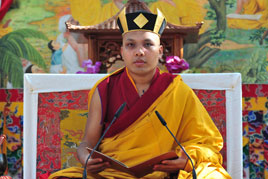
37th Kagyu Monlam Schedule
Tibetan / English / Chinese • French • German • Indonesian • Korean • Polish • Russian • Spanish • Vietnamese
Dharma Teachings
 Meditation Instructions
Meditation Instructions
Recorded during the 37th Kagyu Monlam, Bodhgaya, India. January 28-30, 2020.
